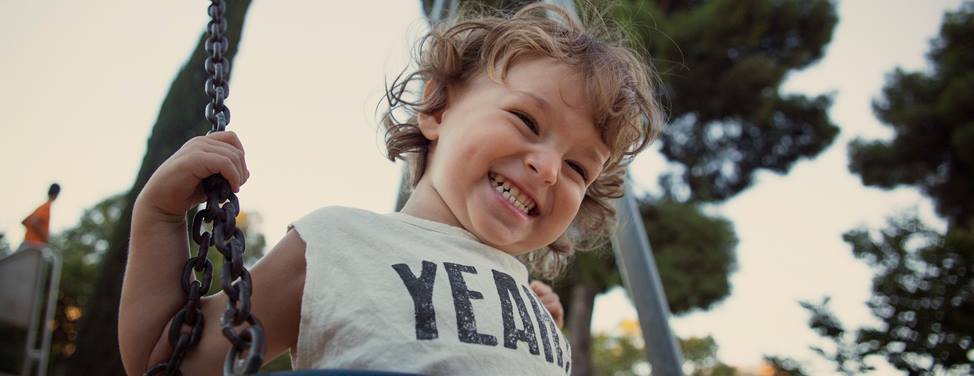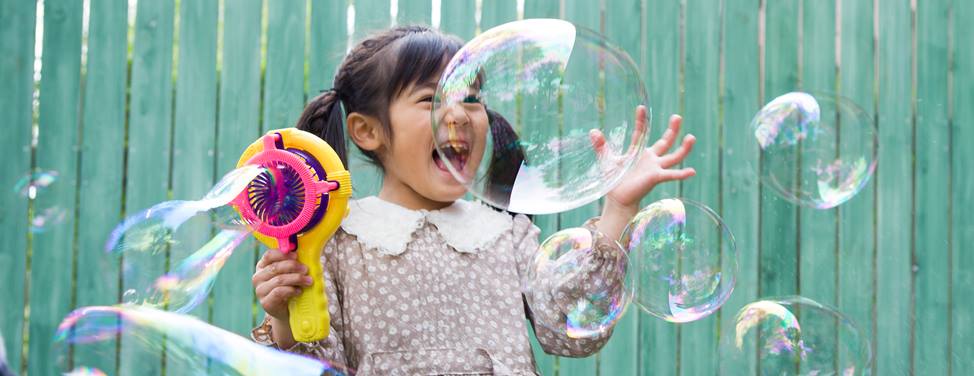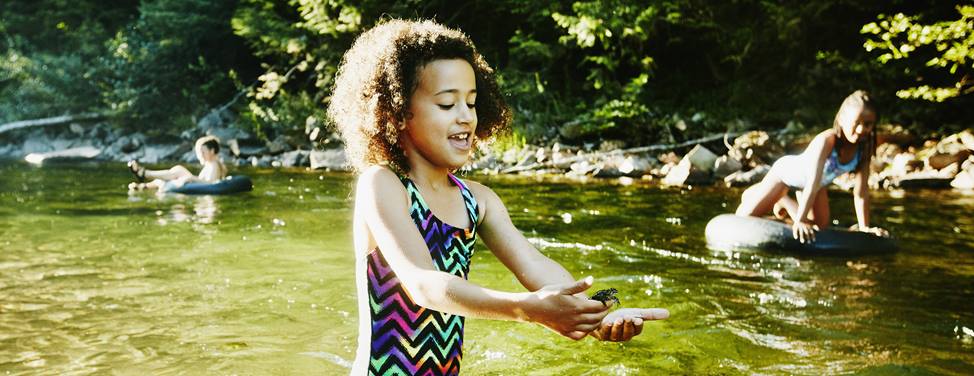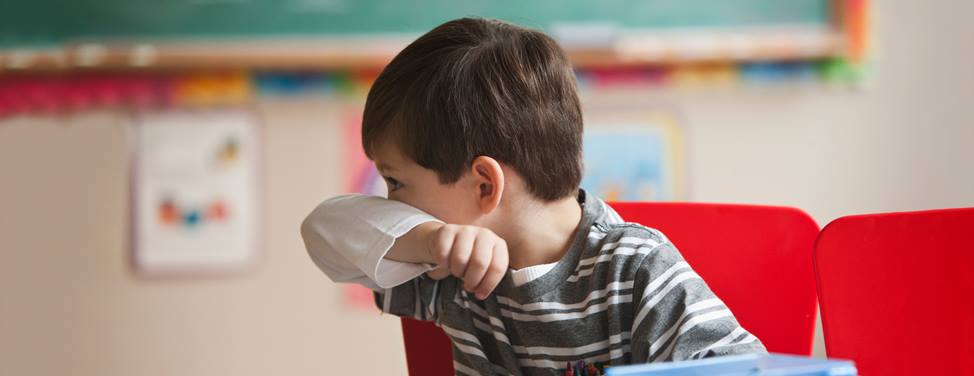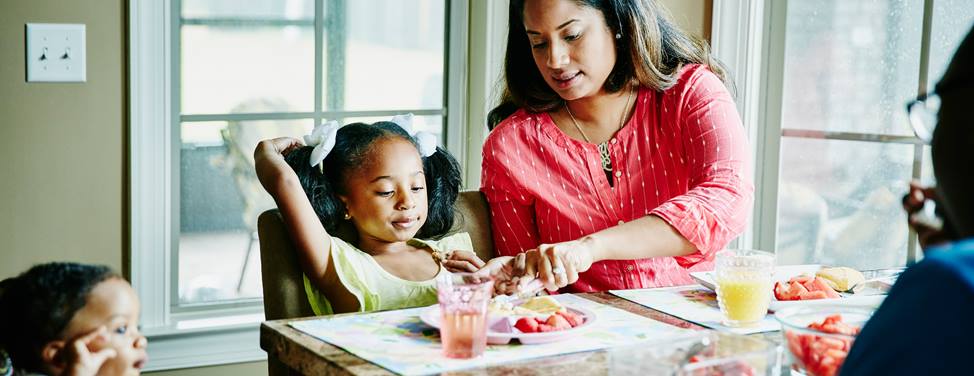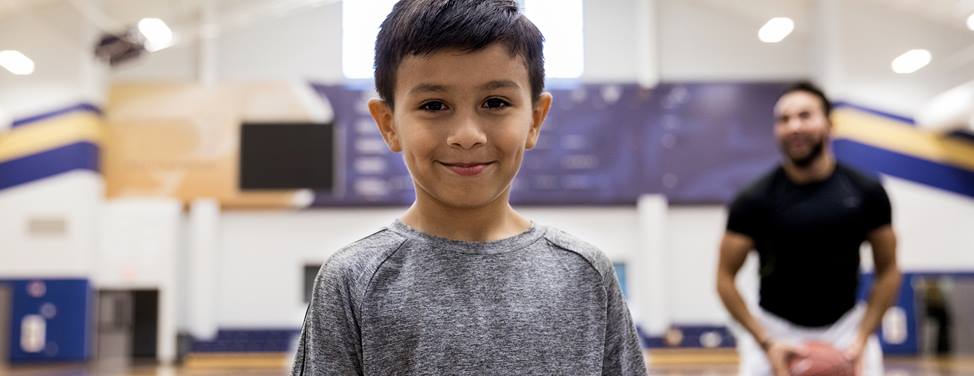Children this age have entered the wonderful world of language and imagination that allows them to explore their world through words, play and fantasy. They will be developing their view of themselves, their sexuality, friendships and family relationships, and will be learning how to adjust their behavior so that it is appropriate for different settings. It is very important for parents to help their 3- to 4-year-olds learn right from wrong, and to help them control their actions even when their feelings seem out of control.
Nutrition
At this age, children thrive on routine and will probably want to eat the same foods over and over. You would probably enjoy reading the book Bread and Jam for Frances together, and your child will likely recognize him or herself in the story.
Mealtimes should be fun and relaxing. Remember that it is your responsibility to buy and prepare the food and offer it to your child; it is your child's responsibility to choose whether to eat it. You can accommodate your child's wishes for having a favorite dish at every meal, but provide other nutritional foods as well. Some helpful hints:
- Try to offer a fruit or vegetable at each meal. Some children enjoy vegetables if they can dip them into a dressing, or will eat broccoli covered with melted cheese.
- Limit milk to 16 ounces a day.
- Limit juice to 4 ounces a day. There are many juices sold in kid-friendly packaging, but your child should not drink more than one a day. On trips, bring water in a small container instead of juice — it's cheaper and much healthier for your child.
- Limit high-fat, high-calorie snack foods. Don't buy chips, sodas or cookies — if you don't buy them, they won't be available.
- Let your child see you making healthy food choices. Your child wants to copy you.
- Prepare food with your child. Kids are much more likely to try food they've helped prepare. Three-year-olds can be taught to wash fruits and vegetables, grate cheese, chop some softer foods, stir, mix and measure.
- Experiment with new foods and recipes. Get creative with food preparation — drawing faces on sandwiches or pancakes, for instance, or cutting food into fancy shapes.
- Children will often eat better and try new foods when around other children, such as in daycare.
- Set an example with your table manners, but do not nag your child about his or her manners.
- Don't use desserts as a bribe or reward.
- Don't beg your child to eat or try new foods, and don't get into arguments about what your child eats.
Mealtimes should be fun family time. Try to eat together as a family at least once a day and use this time to talk about the day's events and your thoughts, interests and values.
Dental Care
Your child should have visited the dentist by now. Pediatric dentists make the visits quite fun for children, so please don't worry — your fears can affect your child's experience. Your pediatrician can give you a referral to a pediatric dentist if necessary. Make sure to brush your child's teeth after every meal, especially before bedtime.
Habits such as pacifiers and thumb sucking can begin to cause malocclusion of teeth at this age. Encouraging your child to limit these behaviors to a certain time and place — in the bedroom and at night, for example — will help your child discontinue the habit.
Toileting
About 75 percent of children have daytime control of their urine and bowel movements by this age, while 25 percent are still not interested in using the toilet. Most children still have accidents and wet the bed at night.
If your child resists using the toilet, remember that this is one area of life in which kids have control. You can't force your child to use the toilet, and it is usually easiest to stop trying. For more information on toileting, please talk with your child's pediatrician.
Toilet-trained children may occasionally have accidents, which can make them very upset. Reassure your child that you understand, and that it happened because his or her body is still learning and growing.
Sexuality
Preschool-age children become interested in their bodily functions, including toileting and sexuality. This is the age when children often "play doctor" with other children to see what kids of the opposite sex look like.
As parents, it's important to understand that your child is learning and exploring his or her environment. Your preschooler is beginning to understand that there are differences between people, including differences in height, weight, race and sex. As children realize that people are different, they learn that they are unique individuals. Ideally, parents feel comfortable with their own sexuality and can talk with their children in a relaxed manner about their bodies and their privacy.
You may need to set limits on your child's sexual exploration. Explain that private areas — the areas covered by bathing suits — are personal and should not be touched by others. It's helpful to also explain the exceptions to the rule, such as when the child comes to the doctor's office for an examination.
Children may masturbate as they discover that touching their body can be pleasurable. Calmly explain that this behavior is private and should be limited to places that are private, such as the child's bedroom.
Safety
Your child can begin learning safety skills. Preschool-age children can:
- Learn their first and last names.
- Begin learning their address and phone number. If your child can memorize the alphabet and songs, your child can memorize these important facts.
- Learn who to go to for help if they get lost. For instance, people in uniforms, people with name badges, people working at cash registers or mothers with babies.
- Use a helmet if riding a tricycle.
- Always be buckled into a car seat when riding in the car.
If you are concerned that you or your child are not safe at home, please speak with your pediatrician or call WOMAN, Inc, an agency serving domestic violence survivors in the Bay Area, at (415) 864-4722.
Fears
Three-year-olds often develop new fears. While the 2-year-old is often afraid of loud noises, strangers, separation from parents and the dark, 3-year-olds are often afraid of things they imagine — things that "might" happen. Your child may develop a fear of imaginary creatures or monsters, or of being physically hurt by storms, other people or accidents. Nightmares are often the child's way of working through fears, and fears can also be demonstrated through play.
Children want to know their parents are there to protect them. Parents should acknowledge their children's fear and reassure them that they will be there to keep the child safe. For example, "I see you are afraid of the thunderstorm. Loud noises can be frightening, but we are safe in our home." During periods when your child is experiencing increased fears, expect some regression in behavior, where your child acts younger than normal.
It's fine to read fairy tales or stories that allow children to work through their fears, provided that the story ends with the child being safe and protected by the adults in the story. However, children should not be exposed to images that are frightening. This means that television and video games should be limited. Be careful of watching violent news stories when your child is in the room.
Language
Your child will rapidly expand his or her vocabulary. As this occurs, kids may have periods of stuttering. If this happens with your child, call the pediatrician for more information.
Help your child use language to describe his or her emotions — excitement, anger and fears. If children can use words to describe emotions, they may be able to better control their behavior.
Imagination and Humor
Preschool-age children often talk and play with imaginary friends. Your child's imaginary friend can experience all the bad and good things in your child's life and help work out conflicts. Please respect your child's privacy regarding imaginary friends; asking questions may limit kids' ability to use their imagination.
Children who watch more than one hour of television a day demonstrate less creativity and imagination. Children who repeatedly watch videos will limit their play to simply repeating what they've seen in the video instead of making up new characters with new actions.
At this age, children also develop a sense of humor as well as the ability to empathize with other people.
Reading
One of the best things you can do for your children is to read with them. Reading introduces kids to many new ideas, new facts about their world and new ways to behave. They also learn fundamental concepts that are important to learning how to read, such as turning pages, reading from left to right and the idea that letters make words. They also begin to learn the sounds that the letters make. Children whose parents read to them every day will perform much better in school.
Don't push your child to learn to read, but if your child is interested, teach the sounds that the letters make. When first learning to read, the short vowel sounds are learned before other vowel sounds. For instance, "a" as in apple, "e" as in elephant, "i" as in Indian, "o" as in octopus and "u" as in umbrella. Your child can then learn to read three-letter words like hot, cat, dog and pot.
Preschool
Parents often feel pressured to enroll their children in preschool. Children this age do not need an academic environment, but they do need the opportunity to play with other children. Children learn through play. They learn how to interact with other children, they use their imagination to develop games and rules, and they learn how to negotiate and problem solve. Preschoolers also need to use their big muscles by running, climbing, throwing balls and jumping. If you are looking for a preschool, look for one that allows children plenty of time for these kinds of activities.
Chores
Chores are a wonderful way for kids to learn about their world. By helping set the table or sort laundry, they can learn skills they will need later on. By picking up toys, they learn they are responsible for helping keep their homes clean and tidy. Saying "I need your help" teaches your child that he or she is an important person in the family. Children need to feel needed, and participating in household chores helps them feel they are important and necessary people in the family.
"Why?"
At this stage, children begin asking difficult questions. Often, their questions may embarrass their parents: "Why is that lady fat?" or "Why is he in a wheelchair?" are common questions. Be prepared to answer questions like this by thinking ahead of time about your values. You can respond that people are created differently and each person is unique, for instance. However, expect your child to pursue the matter with more questions that may shatter your comfort level.
Children may begin to ask questions about life and death. This is a good time for parents to think about their own beliefs and values and how to respond to such questions. Some parents turn to religious institutions to support them as they teach their children.
Used with permission of Jane E. Anderson, M.D.





























